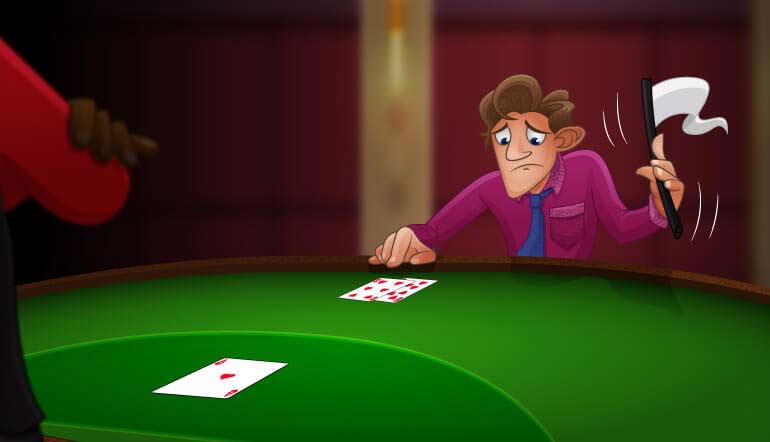In Blackjack, to surrender means to give up your hand and end the round after your initial 2 cards have been dealt, if the dealer’s hole card is an ace, a face or a 10.
The idea is that you do this when you think your hand will probably lose, and get back half of your original bet.
Since the point of the game is not simply to hit a total of 21, but to beat the dealer, surrendering can be very prudent. If you can best the dealer with Blackjack that’s fantastic, but more often you’ll win – or lose less money – because you evaluated your hand in relation to the dealer’s hole card. Churchill might have famously said he would never surrender, but he was talking about World War II and not cards.
Depending on where you’re playing, you’ll be able to choose early surrender, late surrender, neither, or both. Casinos offering these options will balance the advantage you gain with a few other rules that will raise the house edge. To keep the odds in your favour, you need to know exactly when you should surrender. That’s where our guidelines come in.
Early Surrender Strategy
Surrendering early means opting out of the hand before the dealer peeks for Blackjack. The return rate is raised by 0.39% and 0.24% when early surrender is allowed against an ace or a 10-value card respectively.
If the dealer’s hole card is an ace, you should surrender early if you have any of the following hands:
- A hard 5-7.
- A hard 12-17.
- A pair of 3s, 6s, 7s or 8s.
- A pair of 2s, if the rules require the dealer to hit on soft 17.
If the hole card is worth 10, follow these recommendations:
- Surrender early if you hold hard 14-16.
- Surrender early on pairs of 7s.
- Surrender early on pairs of 8s, except if you’re playing single-deck Blackjack and are allowed to double after you’ve split.
- Don’t surrender in single-deck Blackjack if you hold 4+10 or 5+9.
- Don’t surrender in double-deck Blackjack if you hold 4+10.
Late Surrender Strategy
Late surrender means to opt out of the hand after the dealer has peeked for blackjack online. The number of decks and specific game rules influence when you should and should not do this:
- If you hold 17, don’t surrender unless the hole card is an ace and has to hit on soft 17, or of you have 10+7 and are playing with a single-deck.
- If you get 14 in single-deck Blackjack, surrender against a dealer’s 10-value hole card, and against an ace card if the dealer must hit on soft 17 and you hold a pair of 7s.
- If you hold 15 surrender if the dealer shows an ace, hits on soft 17, and your hand is 10+5 or 9+6. Surrender to a dealer’s 10 with the same hands, if you’re playing with 1-6 decks. If the dealer hits on soft 17 and you’re playing with 4-8 decks, always surrender to 10.
- If you get 16, surrender to 10-value or ace cards in single- and double-deck games.

